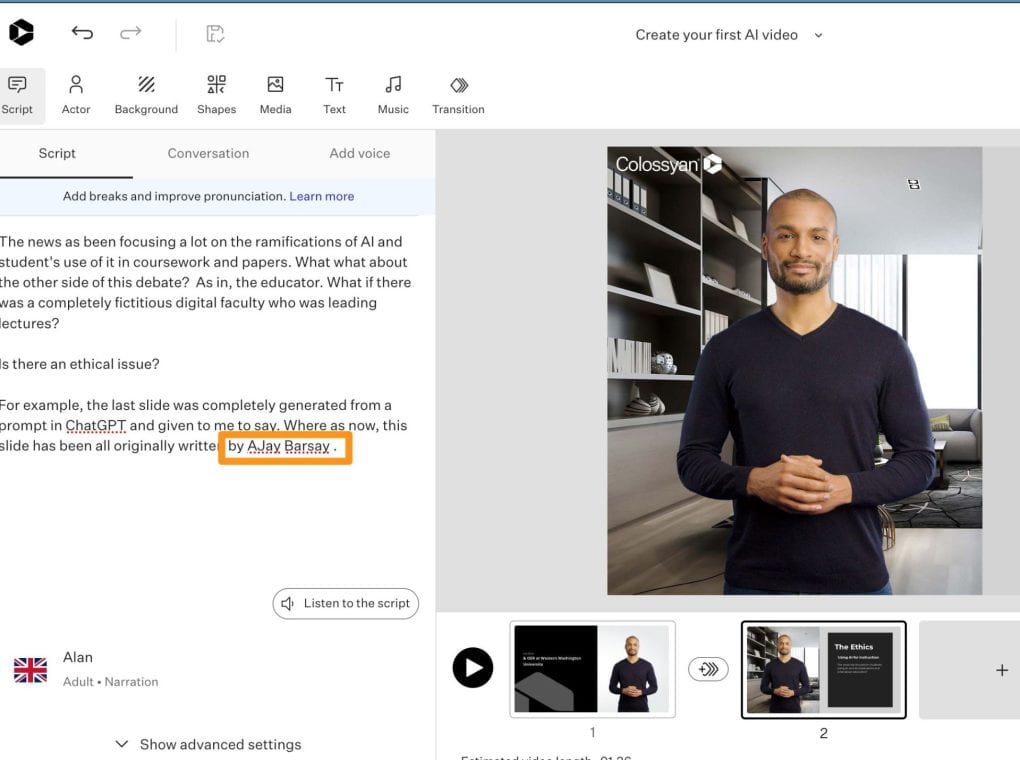The news as been focusing a lot on the ramifications of AI and student’s use of it in coursework and papers. What what about the other side of this debate? As in, the educator. What if there was a completely fictitious digital faculty who was leading lectures?
DIY AI
For a demo and thought exercise, it’s not bad. Is it seamless as if a human actually did it…not quite. But out of it I gained some insights and questions if it moves forward in the EdTech space.

I joking say, that I must have been born to be an educational technologist. My first and surname my family gave me has always thrown off computer systems (and some humans as well) all throughout my life. The pronunciation of two single capital letters have often been issues for forms sure, but especially hazardous for for text to speech systems. For the latter, my name is often treated as just a hard “A” soft “j” combined phonetic sound, as opposed be being said individually. Being Italian-American, my surname almost never gets pronounced with an é at the end as well. This seems to follow into AI, as the data sets they are fed for voice dictation seem to follow suit. So, to accommodate this, phonetic spelling for names have been my normal for these systems. An now, this includes AI.
Artificial Instructional Design Intelligence
In doing this test, I first tested my first and surname. And as epected, it failed with both. With the pronunciation of “AI” as well, so I substituted it in parts of the script as “A-Eye” for the model to enunciate what would be two letters. In the case of “AI” something I realized after I rendered this demo is that its difficulty with AI may have been due to the fact I selected a British accent.
Each AI avatar model software is different in how their digital actor fidgets, blinks, and models their lip movement. Some models are extremely smooth in rendering lip movements but still seem a bit too ridged (below). While others, the opposite can be seen (like above).
In short instances, or with some well thought out cuts and graphics, it can be passable. And the technology today is still relying on a data set of movements from real life actors. In the near future (some software offer it), it could be possible for a user to upload shots of themselves to become the actor avatar. And in the far future, game engines like Unreal and Unity could provide completely CGI generated avatars.
The technology has come a long ways from its early days, and obviously has further to go. We’ve already seen complete CGI avatar modeling extensively with the new release of course of Avatar and the final Matrix film, as well as spin offs of the technology in deep fake style composites like in Star Wars and Tron franchise.
The difference now, is the technology is becoming again more accessible beyond Hollywood level budgets.
As an example, the AI Instruction video I produced above only took about an hour to put together and 30 or so minutes to render.
Automation and Ethics
The ethics around AI and generative works are ongoing, and in the United State I think it will be for some time. From the issues around DALL-E sourcing images that are copywritten to generate new works, to actors being used to become the modeling sets for avatars ; the laws and ethics around these technologies need to evolve much faster pace than it currently is.
But for this instance, as I and ChatGPT wrote in the script for the AI Instruction video, I can see some of the benefits of this technology. Especially if the data set could be tailored for disciplines in higher education for specialized trained machine learning models. For instance, an institution could pool their open academic resources together to potentially train an AI help start OERs. The content would still have to be vetted by subject matter experts (as I can attest to current AI generated texts not always accurate). The AI could future help the automation process by taking these OER works and keeping track of updates for the authors, to better help edit editions. As educators, we already rely on publishers and editors to create and revise books, why not automate it?



You must be logged in to post a comment.